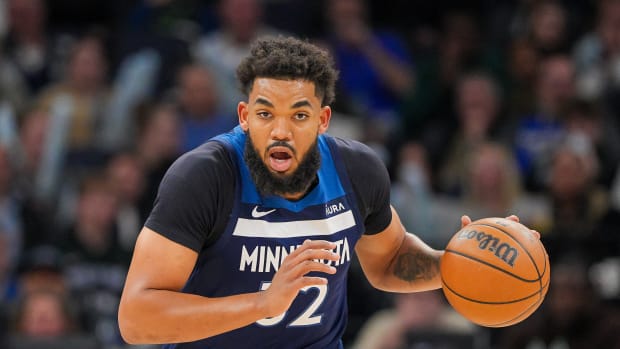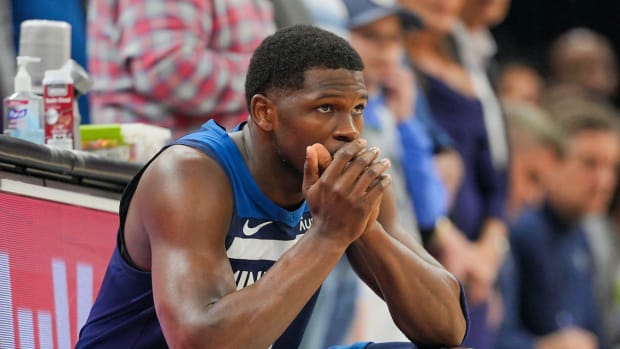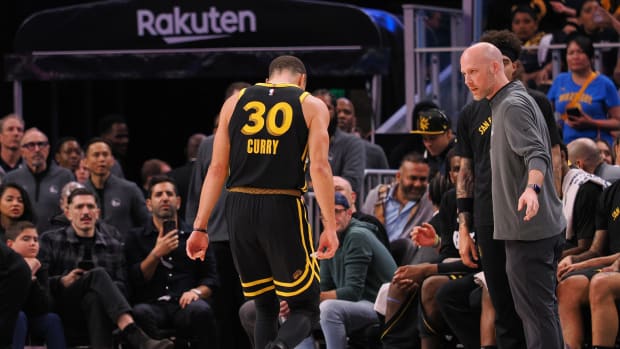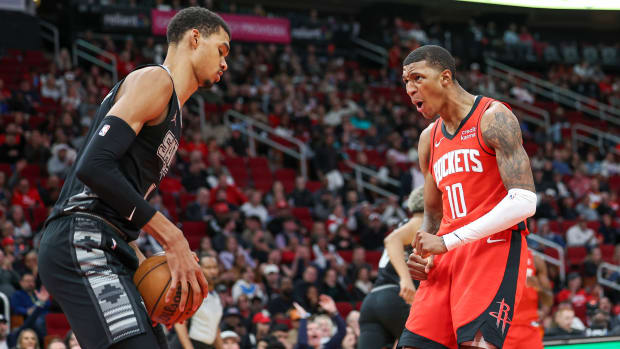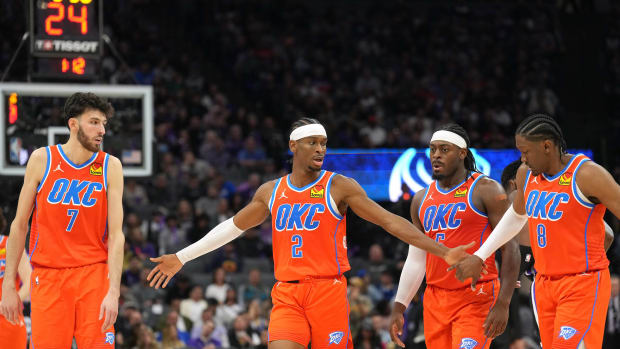Where LeBron James, Cavaliers gained winning ground in NBA Finals
Your teams. Your favorite writers. Wherever you want them. Personalize SI with our new App. Install on iOS or Android.
From the opening tip of the NBA Finals, the Cleveland Cavaliers played from behind. A record-setting 73 regular season wins and the precedent of the 2015 Finals saw to that; general and specific success melded to make the Warriors the clear championship favorites and nothing in the first two games of the series spoke to the contrary.
Yet here we are, the world inverted. Cleveland fell into such a hole in this series that to survive it meant winning four of five games, then three straight with two in Oakland, then a charged Game 6 after Draymond Green's return, and finally a Game 7 heavy with consequence. The Cavs did it all. Whatever pressure built in the Finals seemed only to serve as Cleveland's propulsion, onward and upward to match the rising stakes.
The Cavaliers ultimately won the NBA title because of LeBron James's orchestration. By choice, the Warriors had challenged James to shoot jumpers and surrendered to him a few precious feet of open space. LeBron took the jumpers and the space, too, running into drives that compromised defenders and forced rotations. The mismatched were left at his mercy. Those better suited for the job still had to wrestle with a locomotive forward resolute in his commitment to make the right play.
• The Promise Keeper: Lee Jenkins’s cover story on LeBron delivering a title
James trades almost equally in power and finesse, but it's his judgment that makes him so special. Given time, he worked out the patterns of this series and isolated what was needed on any given possession. Bulk post-ups were never the order of the day against a defense as savvy as Golden State. Beating the Warriors demanded more inspired problem solving—the very kind that emboldened James over the last three games of the series.
The Cavaliers ultimately won the NBA title because the Warriors played out the series as if nothing had changed. Stephen Curry threw needless behind-the-back passes to the very last moment. In the final game of his team's season, Steve Kerr seemed to underplay his best lineups to siphon off self-destructive minutes for Anderson Varejao and Festus Ezeli. Golden State might well have won in five had Green been more composed in the moment that earned his one-game suspension, or perhaps even sooner had the Warriors not walked into Cleveland for Game 3 as if the series had already been won.
Golden State's season never came easy but it did come charmed. The shots always fell when they needed to. Any careless start and early deficit could be erased within a few minutes. Given enough repetition, no team could survive the Curry-Green pick-and-roll. This is what 82 games taught the Warriors to believe, and during the Finals they played as though they expected the same to ring true. The Finals turned when it didn't. Golden State still worked hard and played relatively well on balance, but was stood up in the end by the same strokes of destiny that had carried them to 73. There was too much to overcome, and for that the Warriors have some of their own bad habits and poor decisions to blame.
• Get SI’s Cavaliers NBA Championship package | In depth look at The Block
The Cavaliers ultimately won the title because Kyrie Irving trades in the implausible. Isolation basketball can be dramatic but unpalatable. The rub is in the name; the very act is in itself isolating, not only to the player creating offense but to all of his teammates standing idly by. Too much of it bloats an offense and causes a team to drag. Just enough from the right player, however, can supplement a team's scoring and even galvanize their efforts. So many of the implications depend on the results. Irving, over the back half of this series, delivered them to ridiculous, positive effect.
Even the shot that sealed the series was just the kind that should likely not have been taken: a side-stepping three out of a series of dribble moves, close enough to Curry that Irving had to jump at a recline just to attempt it cleanly. A legendary NBA moment sprung into existence off his fingertips. It was timely, it was difficult, and it was exactly what had made Irving so instrumental over the course of the series.
The Cavaliers ultimately won the title because the Warriors had no backup center they could trust once Andrew Bogut was taken out of the series by injury. Ezeli became just another mismatch that Cleveland could single out and attack. Marreese Speights barely saw the floor after the Cavs played him off of it. Varejao would set screens with the best of intentions, yet triggered traps in the process that he had no way to help solve. Cleveland's exploitation of those in-over-their-head backups was systematic and brutal. In Game 7, the minutes Ezeli and Varejao logged between them were responsible for an 18-point deficit in a game the Warriors lost by four.
The Cavaliers ultimately won the title because they made Curry a target. Whether by his lack of focus, foul trouble, or building fatigue, Curry paid a price in each of the last three games for the depth of his defensive involvement. On every possession, Curry was made to work. Iman Shumpert and J.R. Smith became screeners specifically to challenge him. Irving's eyes went wide whenever Curry switched over to guard him. James drew Curry on mismatches and forced Curry to body up or, with Golden State's adjustments in Game 7, step up high on the floor. Cleveland made it a point to pick Curry out whenever possible and edged out a team that needed the MVP to make tough shots on tired legs.
• LeBron delivers Ohio's first title | LeBron, Draymon reroute history
The Cavaliers ultimately won the title because Harrison Barnes lost his connection with the qualities that make him so useful. There may be no element of Barnes' role more important than keeping the defense honest. He failed in that capacity by shooting 5-of-32 (15.6%) from the field over the final three games, all but begging Cleveland to desert him completely in coverage. The Cavs obliged, and from then on all that the Warriors did—down to fielding competitive lineups—grew more complicated.
The Cavaliers ultimately won the title because Tristan Thompson was everything Cleveland needed him to be. That included: a heady big who could control the pass, rise, and finish in traffic; a voracious rebounder who effectively scared Kerr out of fielding his best lineups; a screener who single-handedly disrupted elements of Golden State's game plan with his timing and physicality; a big capable of picking up Curry on defense and holding his ground; a roll man with the touch and presence of mind to either float a shot to the rim or kick out to an open man; an underrated help defender; and a frontcourt rock around which Tyronn Lue could build his rotation. Even in the darkest stretches of the Cavs' Finals, there was never any question as to how much Cleveland needed Thompson on the floor.
These factors presented Cleveland its winning ground. On it the Cavs gave chase in a series thought beyond them, rallying through redoubled efforts and clarified purpose. For three straight games they stared down their own elimination. And in three straight games they beat the Warriors, the odds, and the whole of the NBA record.































